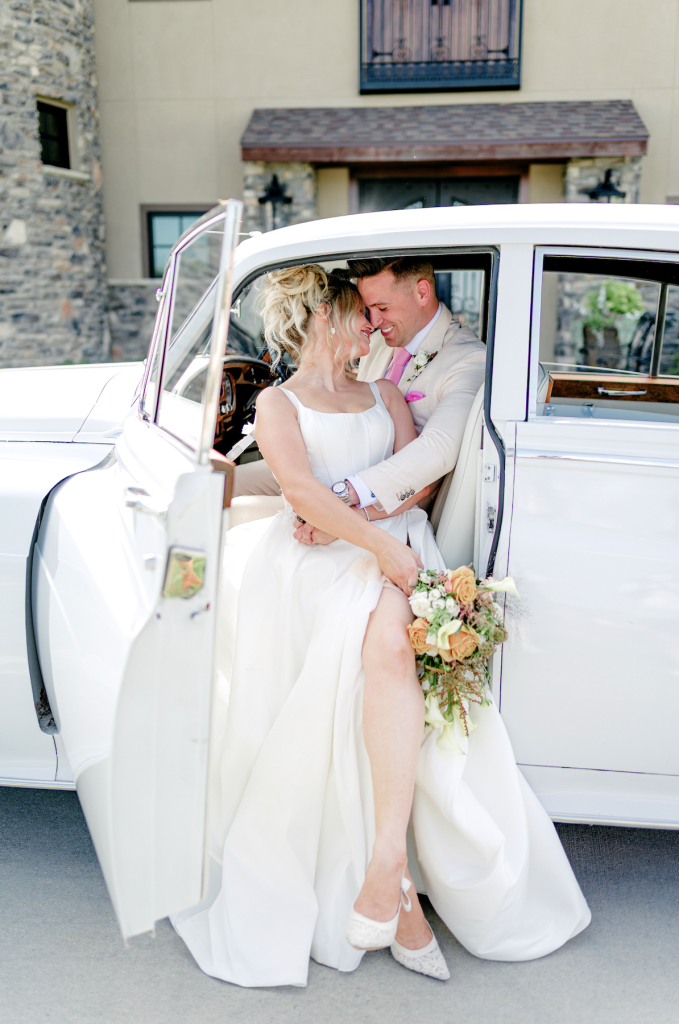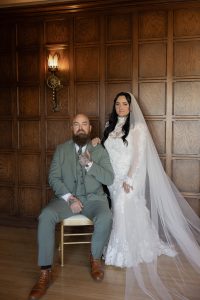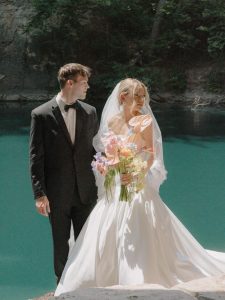Creating a budget for your wedding is one of the most important wedding planning steps you can take. However, even after making a budget, some couples still find themselves surprised with unexpected costs or fees. We’re here to make sure that doesn’t happen to you with our comprehensive guide to hidden wedding costs you might have overlooked. Keep in mind that budgeting is about knowing what you have to spend and putting the greatest amount of resources into what is most important.
This guide will help you keep your budget on track by planning for those hidden wedding costs — so the only surprising thing on your wedding day will be how well your great aunt can dance.

Photography // Jennifer Weinman Photography
ALTERATIONS
Whether it’s a wedding dress, tuxedo, groomsmen suits, etc., alterations can be expensive depending on the type of work and you will want to budget accordingly. They can range in cost from $100-$500. For example, are you using a vintage dress or reworking an entire part of the gown? Alterations that require more heavy lifting like fixing beading or moving zippers and such will add to your cost.
CAKE CUTTING FEES
If you don’t use a venue’s in-house chef or an approved cake company, they often require a cutting fee that is typically around $1-$2 per guest. It can go as high as $7 in rare cases. Be sure to talk with your wedding planner, caterer and/or venue manager to nail down those details.
CLEANING FEES
Cleaning fees are often added to the total of your venue contract. Keep that in mind when you are planning to select your venue. Be sure to ask if the quoted venue rental cost includes cleaning, damage deposit and any other additional costs. Your wedding planner or the venue manager will be able to help you with this.
If you are planning a wedding at a non-traditional venue space, you may be responsible for clean-up and this might look like hiring or arranging for someone to clean up after the event.
CORKAGE FEE
Some couples bring their own wine or champagne to save money or because their venue doesn’t serve their preferred vintage. When you do this, venues charge a corkage fee which can range between $10-$40 per bottle.
(Never heard of corkage fees? Check out our Wedding Terminology Guide to make sure you’re in the know on all wedding planning lingo.)
DAY-OF MEALS
Depending on when your wedding is, you will likely need one to two meals on the day of your wedding for yourself and your wedding party. Whether that is something you take care of or not, you want to plan ahead. This is a common hidden wedding cost that gets forgotten and sends people scrambling. It doesn’t have to be elaborate. The aim is to eliminate little costs from adding up into a big hit on the budget.
DAY-OF SIGNAGE & PAPER NEEDS
When budgeting for your wedding paper (think invitations, etc.), you want to be sure and keep the actual wedding day in mind. In addition to the place cards, escort cards and programs, you need to plan for any signage costs. These may include signs for your signature cocktails or instructions for the sign-in table. Run through this with your wedding planner or planning partner to consider what the day-of signage and paper needs will be.
FITNESS + WELLNESS PROGRAMS
Will you be doing any fitness or wellness programs — or perhaps a more aggressive beauty regimen with facials to prep your skin for the big day? If so, these are costs that you will want to prepare for as this can range from hundreds to potentially thousands of dollars.
GUEST TRANSPORT
Some couples consider having a designated driver/transportation option to help safely transport guests home. This isn’t a must, but if this is something you would like to do, it’s great to plan ahead for your budgetary needs.
HAIR + MAKEUP TRIALS
Wedding beauty trials — including hair and/or makeup can cost anywhere from $50-$150. Most are under $100 depending on the type of service or services you are looking for. If you end up wanting to get trials with multiple stylists, this can add up.
HOTEL ROOM FOR THE NIGHT BEFORE
Do you plan on staying at a hotel the night before your wedding? Many people do it because of logistics or comfort. It can be a more peaceful way to start the day. This should be added to the budget if it is needed.
INSURANCE
Not everyone will have this cost, but for couples who prefer to have wedding insurance, that needs to be added to your wedding budget. On average, this can be around $100 – $500.

Photography // Breanna Maxwell Photogragraphy
LIGHTING
Most venues will come with standard lighting, but if you want custom uplighting or Gobo lights (think customized wedding initials projected at your reception), that will likely be an additional cost. The hidden wedding cost here might be if you pick a unique venue that needs to be heavily lit — such as an outdoor reception at night or someplace that isn’t a traditional venue. This can range between $200-$2500 depending on your lighting needs.
MARRIAGE LICENSE
All this planning is about getting married, so it’s amazing, but true that some people overlook the marriage license cost. It can range between $10-$115, depending on where you’re getting married. It’s not a huge additional cost, but if enough small items add up that makes a big impact on your overall expense.
NON-VENUE APPROVED VENDORS
Your average wedding venue usually comes with a list of preferred vendors. If you choose not to go with venue-approved vendors, there is a fee for picking off the list. So, while you may think you’re saving money to bring in your own flowers or food, depending on the fee, you might just be breaking even — or even spending more. If your choice is motivated by the budget, be sure the fee doesn’t affect that. The fees can be as much as 20 percent.
OVERTIME
Each of your vendors has a contract for their time. If your event runs late or long, etc., they often have an hourly rate that will be added. Be sure you are aware of which vendors have this and what the cost will be total.
PERMITS
Are you using a park or doing something that needs permission from the local government? If so, you may need to budget for permits and usage fees.
POSTAGE
Non-traditional shapes, heavier paper, more pieces, etc. These are all reasons to keep an eye on your postage budget. This isn’t included in the invitation suite total. And the postage itself can range greatly depending on what all you’re sending and how you’re sending it. Things like return cards (or RSVPs) are also something to consider. Also, it is considered proper etiquette for couples to send a stamp on that card, so it’s not just the mailing cost, but the return mail cost to consider.
RENTAL LATE FEES
This one doesn’t have to be a hidden cost, but it can be a surprise if you don’t have a plan for the timely return of all rental pieces. If you have rented your own table or chairs, and even the venue can come with late fees if they are not returned or left promptly.
SETUP & TEAR DOWN FEES
From florals to decor and other rentals, your vendors may require a setup and delivery fee. This will depend on the type of contract you have with them. Couples without a wedding planner need to be especially careful of this type of fee. Oftentimes people take this for granted as being part of the general contract.
SOUND EQUIPMENT
Whether or not your venue comes with sound equipment may affect the cost of your DJ or band. Many traditional wedding venues come well equipped, but it’s important not to assume this and discuss your needs/preferences with your planner, DJ/band, and venue manager.
TASTING FEES
This can range from picking wines, selecting signature cocktails, deciding on your cake, and/or menu items. Ask your caterer, baker, and/or venue manager about tasting fees as you plan your wedding. In some cases, tastings can be free, but it’s best not to assume anything.
TAXES, TIPS & GRATUITY
Taxes can vary by state and they are often overlooked when it comes to the overall total. Tips and other gratuities for everything from catering to valet and entertainment — it all adds up. While it may not be fully a hidden wedding cost, it’s important to review all the tips that may be part of your wedding cost.
We have a helpful resource on all the wedding tipping etiquette for you right here.
TRANSPORTING RENTAL EQUIPMENT
Just because you rented it doesn’t mean the transportation is covered. Especially if you do not have a full wedding planner helping with all these details, you will want to check and double-check what the full rental costs will be — including transportation as well as pickup. This cost can range from $100-$350.
UNEXPECTED GUESTS
It’s not uncommon for unexpected guests to be added at the last minute (think great aunt who decided to travel after all), so be sure to work with your wedding planner to add into the budget an amount for emergencies. This may come in the form of extra chair rentals, extra meals, extra cake, etc. In many cases, this is planned for with each vendor, but don’t assume it is.
UNEXPECTED RENTALS
When budgeting for your wedding cost, don’t overlook all the potential rental needs. For example, if your reception venue doesn’t provide wedding decor such as linens, flatware, tables, chairs, and more in your contract, you will need to plan for that cost. In addition to that cost, take into consideration the rental delivery cost as well, which can run anywhere from $50-$500 depending on the size of your wedding and rental items.
VENDOR MEALS
Don’t forget to add any vendors working during the wedding to your headcount for catering. There are often vendor meal options that are less expensive.
Photography // Aaryn Mae Exposures
WEDDING ATTIRE & ACCESSORIES
Shoes, jewelry, undergarments for specific dress silhouettes, and more. The wedding dress or suit isn’t the only cost for wedding attire. Think through every piece you will need/want on that day and build that into your wedding budget. You may find that you don’t have to plan for a lot, but we’re here to make sure nothing surprises you.
WELCOME BAG DELIVERY
Delivering your welcome bags to the hotel is not the end of the story. They still have to deliver the bags to the individual rooms. This will be an added cost, on average, of $5-$7 per bag.
WEDDING TROUSSEAU + BEAUTY COSTS
If you want to be extra prepared when it comes to your wedding budget, include your pre-wedding outfits and expenses that may go above your standard needs. For example, if you’ll be needing several special occasion outfits for showers, your bachelorette trip, or rehearsal dinner — this is a great way to not be surprised by extra costs at the last minute. So many people consider the event the only cost — and not what it will take to get you ready for that event.
Also, take into consideration your honeymoon wardrobe, if that does above and beyond your standard living costs you may want to add that to your budget.
WEDDING PARTY GIFTS
Your personal budget for this will vary, but this is often something that gets overlooked when it comes to budgeting. Consider what you want to do as gifts for your wedding party throughout the entire celebration process and be sure to add that into your budget. This includes if you do any proposal gifts when you ask them to be part of your wedding party.
Don’t forget about gifts for parents, important family members, and even each other!
AFTER THE WEDDING
There are costs to budget for after the wedding too! From thank you’s, photo prints, bouquet and/or gown preservation, and more. When it comes to thank you’s, be mindful of the postage cost as well.
PRO-TIPS FOR DEALING WITH HIDDEN WEDDING COSTS
-
- Get a wedding planner
We always recommend some type of wedding planner. If you don’t think a full planner is for you, even a month-of planner or coordinator is highly recommended because there are so many moving pieces and they are experts at getting everything together. It reduces wedding stress and can help your budget in the long run.
-
- Budget for your backup plan
Whether it’s a rain plan or something similar, be sure you’ve taken contingencies into account when it comes to budgeting.
-
- Get everything in writing
Don’t assume you have the totals based on what a vendor said in a meeting. Get every total in writing, officially documented and finalized.
-
- Read the fine print
Once you get everything in print, even if you have a full wedding planner helping you with everything, read the fine print for yourself. Everyone is human and it’s always better to have multiple eyes on something.
Now you’re prepared for pretty much anything — including any hidden wedding costs.
Happy Planning!
Other Local Vendors:
TenFifteen Events

















